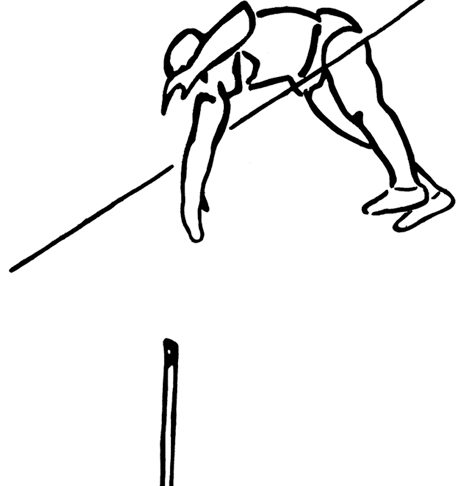Who is in charge to think about: what, when, why?
The following graph shows the evolution of an athlete towards self-dependence, how it should be in my opionion. As shown the relation should change from a leading position of the coach towards a leading position of the athlete.

Next is an E^example of an athlete struggling / missing to become a self-dependent sportsman:

This athlete remains dependent to his coach and is at risk not making use of his potential.
This graph is typical for an athlete-coach-relation, where two things come together:
First, an athlete that was and stayed used to be relied on coaching, advices and instructions.
This athlete never started to become a self-dependent athlete, he was quite all the time a puppet of his coach (not by purpose but as a result). For this athlete it was usual, that the coach tells you what, when and how often you have to do things. The athlete was nurtured that the coach knows best, what is best for the athlete; himself he didn’t need to worry about it.
Second, a coach that is used to athletes, that are “his athletes”, doing what he is teaching them.
This might work, if the coach is of the highest quality in his area (technically, educationally and psychologically) and if his athlete can act like a robot doing what his coach is telling him.
If the coach does not have a solution for every issue that may occur, then the athlete’s progression stops, because the athlete missed to learn to take care for himself – and who could in a situation, where his coach doesn’t find a solutation, possibly find one.
If the coach is not of the highest quality the athlete will never get aware of the coaches and his own lack of quality because the athlete never started to think about pole vault himself.
Let’s say only 5 out of 100 pole vault coaches can get 95% out of an athlete by coaching them like robots. The athletes of the remaining 95 coaches will not make use of their potential if they do not at some point start to take care of themselves (and maybe find out that they have to change their coach). Furthermore the athletes of the 5 very gifted coaches will not reach 99 or 100% if they do not contribute their part to success.
If an athlete/coach-relation is like shown in the graph above, you hear phrases like: “My coach says, it is important that I do ……..” “My coach want’s me to do……“
There’s nothing wrong about phrases like this, if the athlete is in the initial coaching phase (Phase 1). But if you hear that from an athlete, doing pole vault for let’s say 8 years, there is an issue. That athlete should say things like: “My coach and I are working on ….” “My coach told me to think about ….and I see his point and have to find out, if that helps me to jump better.” “I told my coach that I want to work more on (part of the jump) and he answered (something), that I have to think about now.”
In individual sports (like track and field, tennis) the athlete has to become the head of the game. There’s the athlete – and then there’s also a coach. It’s only opposite in Phase 1. In Phase 2 there has to be a transformation. That’s where we find out if things are going the right way.
Coaches may be “stars” by how good they are in coaching, but an athlete in Phase 3 must see himself always as the more important, the bigger “star” than his coach. It is about him, not about his coach. The coach will never be the person standing there, third attempt for the gold medal. The coach is guiding the athlete up to and preparing for that moment.
(that might be/is different in team-sports where a coach decides about who is playing and tactics. These coaches have to be the head of the game and they should be the “star” of the team).
A coach doesn’t lose his function (and self-esteem or rank) if the athlete is head of the game. A coach is someone having an idea to get the best out of an athlete and he tells the athlete about his ideas. That is the same with a beginner as it is with Mondo Duplantis, Renaud Lavillenie or Roger Federer. Also for them their coaches stay important. These sportsmen care for themselves, they listen to their coaches and think about, what they tell them. They compare the advice of their coaches with their own experience and draw conclusions. If such a sportsman changes coach she/he does not have to make big changes as they rest the same and only get a new adviser they can share thoughts with. If you got a pole vaulter dependent on his coach, he might not jump the same level again or until he found a new coach and that coach got things together again, what can take years.
A coach needs to understand himself as a companion of an athlete. It’s like being parents. First you have to give instructions for a certain time to the kids (Phase 1), then you teach them how to find their way in live (Phase 2), and when they got mature parents advice still stays important to them, but they decide self-dependent (Phase 3).
